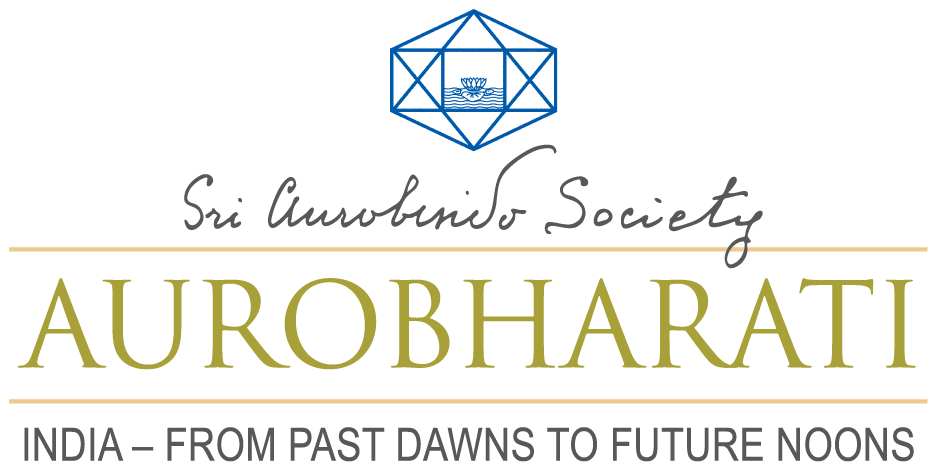Vasudhaiva Kutumbakam: Vedic Vision of Peace and Sustainability
Location: Online
Institute: AuroBharati
“The Veda Samhita is the eternal source of the dharma, culture and spiritual
knowledge of India.”-Sri Aurobindo
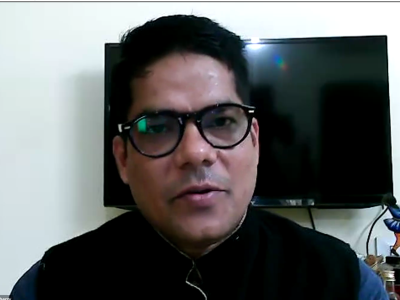 AuroBharati, the Sri Aurobindo Society, Union Territory of Puducherry introduced the “Vedic Heritage Study & Research Forum,” a new initiative, on the auspicious festival of Krishna Janmashtami. This forum’s main goals are to preserve and promote the Vedas through in-depth research and outreach initiatives.
AuroBharati, the Sri Aurobindo Society, Union Territory of Puducherry introduced the “Vedic Heritage Study & Research Forum,” a new initiative, on the auspicious festival of Krishna Janmashtami. This forum’s main goals are to preserve and promote the Vedas through in-depth research and outreach initiatives.
First edition of the forum, ‘Vasudhaiva Kutumbakam: Vedic Vision of Peace and Sustainability’ held on 21st September, 2024. The session was co-ordinated by Dr Kishor Kumar Tripathy, Member Secretary, AuroBharati, Sri Aurobindo Society, Puducherry. Speaking on the occasion, Dr Tripathy highlighted about the goal of the forum to establish a global network of institutions and individuals for innovative discourse and comprehension of the Vedas as an Intangible Cultural asset.
Speaking at the event, Dr. Tripathy stated that the Vedas are considered to be the source of all wisdom and knowledge, as well as the head of knowledge. The ageless scriptures known as the Vedas are the key to solving the enigma of world history. He underlined how closely connected the visionary, poet, yogi, and philosopher Sri Aurobindo was to the Vedic heritage. Through his interpretation and synthesis of Vedic wisdom with modern concepts, he unveiled the Vedic secret.
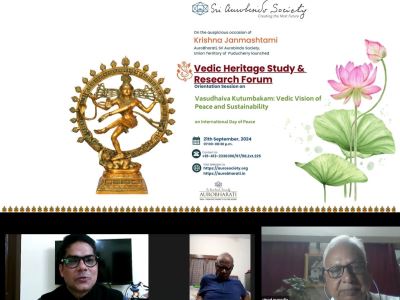 Emphasizing the spirit of International Day of Peace, Dr Thipathy said about the significant aspects of peace by referring the mandate of UN “not only is the absence of conflict, but also requires a positive, dynamic participatory process where dialogue is encouraged and conflicts are solved in a spirit of mutual understanding and cooperation.” Dr Tripathy highlighted about the global challenges of peace including, global power dynamics, ethnic and religious tensions, conflicts and wars, economic instability, vilotaion of human rights and political instability which has caused serious problems for sustainability.
Emphasizing the spirit of International Day of Peace, Dr Thipathy said about the significant aspects of peace by referring the mandate of UN “not only is the absence of conflict, but also requires a positive, dynamic participatory process where dialogue is encouraged and conflicts are solved in a spirit of mutual understanding and cooperation.” Dr Tripathy highlighted about the global challenges of peace including, global power dynamics, ethnic and religious tensions, conflicts and wars, economic instability, vilotaion of human rights and political instability which has caused serious problems for sustainability.
Dr Tripathy highlighted the concept of Vasudhaiva Kutumbaka and the Vedic vision of peace and Sustainability in the light of Sri Aurobindo. Maharshi Aurobindo, through his interpretation of the Vedic hymns has addressed critical issues related to Peace and unity “I seek not science, not religion, not Theosophy, but Veda—the truth about Brahman, not only about His essentiality, but about His manifestation, not a lamp on the way to the forest, but a light and a guide to joy and action in the world, the truth which is beyond opinion, the knowledge which all thought strives after — yasmin vijïate sarvam vijïatam.”
He focussed on the teachings of Sri Aurobindo on the application and discovery of the Vedas “I believe that Veda to be the foundation of the Sanatan Dharma; I believe it to be the concealed divinity within Hinduism,—but a veil has to be drawn aside, a curtain has to be lifted. I believe it to be knowable and discoverable. I believe the future of India and the world to depend on its discovery and on its application, not to the renunciation of life, but to life in the world and among men.” — Sri Aurobindo (Essays Divine and Human, Vol. 12 [CWSA]).
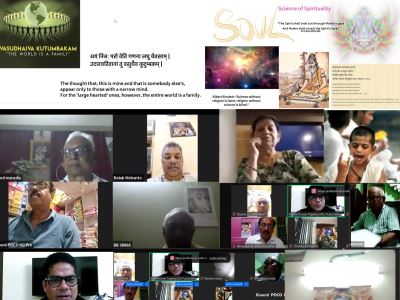
He emphasized on the cosmic creation and life on earth and the three levels of obstacles to peace including, ādhyātmika duhkha or tāpa (which is caused by bodily suffering and mental anguish), adhidaivika (pertaining to the daiva or fate, unseen forces and gods) and ādhibhautika duhkha or tāpa (which is caused by other bhutas or living beings). He gave several references from the Vedas, Upanishads and classical Indian Scriptures and mentioned about the vision of the Vedic mystics for peace.
Dr Tripathy also highlighted about India’s role in promoting peace in a global scenario in the light of Sri Aurobindo “A widest and highest spiritualising of life on earth is the last vision of all that vast and unexampled seeking and experiment in a thousand ways of the soul’s outermost and innermost experience which is the unique character of [India’s] past; this in the end is the mission for which she was born and the meaning of her existence.”
He suggested that economic development, human rights advocacy, diplomacy, dialogue and education and economic development may be a solution for peace and sustainability. Subsequent discussion held on the topic by the participants. Institutional networking, research projects, and community outreach programs for a range of geographic, racial, cultural, and educational backgrounds will be the main areas of attention of the Vedic Heritage Study and Research Forum.
ॐ द्यौः शान्तिरन्तरिक्षं शान्तिः
पृथिवी शान्तिरापः शान्तिरोषधयः शान्तिः ।
वनस्पतयः शान्तिर्विश्वेदेवाः शान्तिर्ब्रह्म शान्तिः
सर्वं शान्तिः शान्तिरेव शान्तिः सा मा शान्तिरेधि ॥
ॐ शान्तिः शान्तिः शान्तिः ॥
— यजुर्वेद ३६:१७
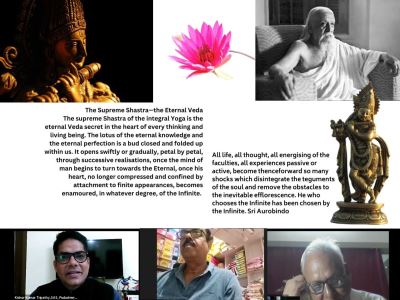
Om. May peace radiate there in the whole sky as well as in the vast ethereal space everywhere. May peace reign all over this earth, in water and in all herbs, trees and creepers.
May peace flow over the whole universe.May peace be in the Whole Universe.
And may there always exist in all peace and peace alone.
Om peace, peace and peace to us and all beings!
— (Translation by Ramakrishna Vedanta Math, India)
